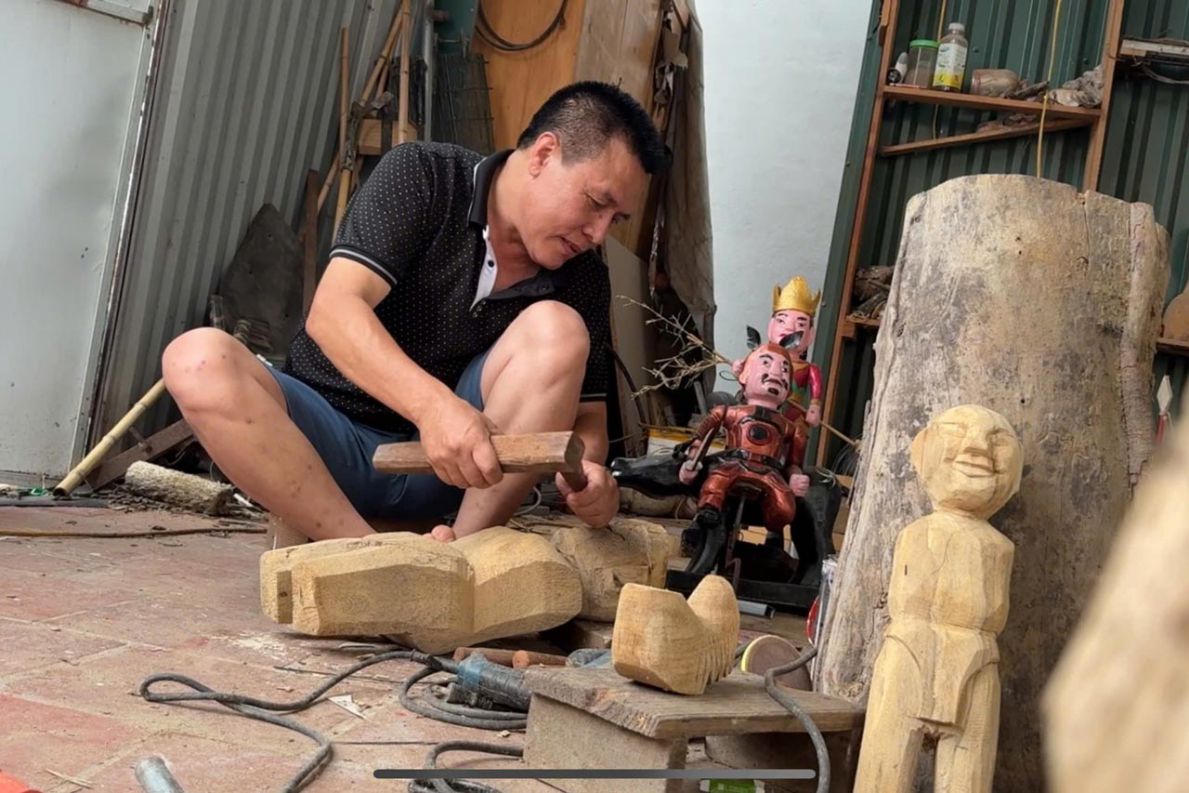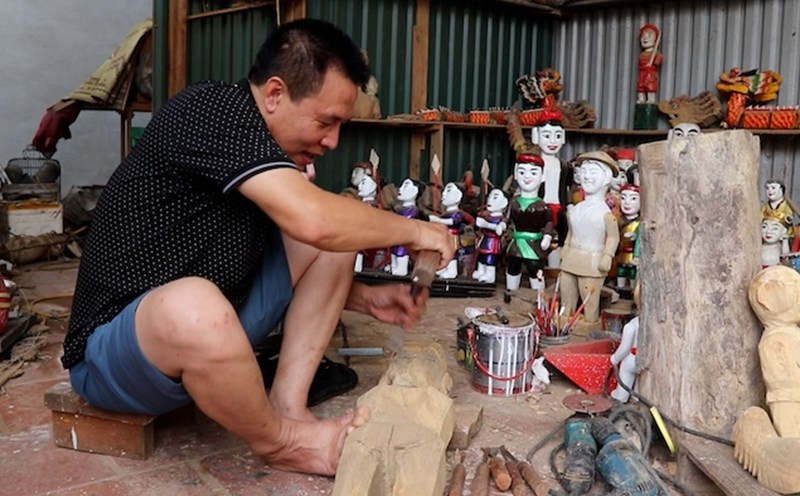meticulously in each stage
Mr. Nguyen Van Phi (Thuy Lam commune, Dong Anh district, Hanoi) said that he has been involved in water puppetry for more than 20 years. However, since the puppets were damaged without anyone repairing or renewing them, he has switched to wood sculpting to make puppets. To date, he has maintained this job for more than 11 years.
"You have to understand the plot and movements of the stage to create a properly-taught puppet," Mr. Phi shared, his eyes lit up with pride.
For me, a puppet is not just a manual product, but a real character, carrying its own story, its own personality and the soul of the ancient Vietnamese people.
The main ingredient for making puppets is fig wood. This is a type of light wood that is easy to grade and float on the water surface. But for a piece of wood to "perform" and express emotions on a water stage, the processing process requires meticulousness and meticulousness in each stage, from choosing the right wood block, shaping, moving joints, to lacquer and costumes. Everything must blend into a soulful whole, Mr. Phi shared.
According to Mr. Phi, making a puppet is not difficult, but for it to survive and perform, the whole soul of the craftsman must be put into it.
stick with the profession
In an era where many young people choose to switch to technology, following a trendy profession, plowing through a wooden hammock is considered "opposite the trend". Many times, Mr. Phi heard people in the village say " fall in love" with him while still attached to a profession that few people pursued. But for him, it is not just passion, but responsibility.
"Every time the puppet is brought to the stage, I hear the applause of the audience, I feel like I am living one more time. It is the love of the profession that has held me to the ground, I have to accept sacrificing a stable income to keep what belongs to the cultural soul," said Mr. Phi.

According to Mr. Phi, there are currently a few young people coming to learn a trade. They not only learn how to make traditional puppets, but also create, combine new materials, create modern shapes, and seek to bring puppets closer to young people and foreign tourists.
Today, between the digital stage and 4.0 technology, wood puppetry is no longer as popular as before. But for us, the profession is still alive, still passed down as a part of the blood," said Mr. Phi while carefully hand painting each drawing on the face of a new puppete.
Mr. Phi said that his puppetry workshop currently regularly organizes tours and free puppet training for students and international visitors. This is both a way to spread passion and a way to preserve and inspire the profession.
Maintaining the profession is to keep the roots
In another corner of the village, artisan Nguyen Thi Thuan - who has been involved in water puppetry for more than 20 years - is still diligent in her work. For her, water puppetry is not only a profession, but the soul of an entire countryside, a childhood memory and a bond connecting with ancestors.
"Water flowers are not just a folk game. It is the way that the ancient Vietnamese people told stories, educated morality, and passed on life experiences through artistic performances, said Ms. Thuan.
Artisan Nguyen Thi Thuan shared that from a rough piece of wood, the puppets are put on a colorful coat, painted with eyes, lips, and finally become characters who know how to laugh, dance, and act. In each movement, each movement on the water stage is an agricultural culture, where Vietnamese people live in harmony with nature, respect, affection and are full of humor and kindness.
According to Ms. Thuan, the current era is washing away many old values. But water puppetry is still like a root, trying to stick to it so as not to be forgotten. People working like her or Mr. Phi are the "soul keepers" - the silent bridge connecting the past with the present, preserving identity among the waves of integration.
Traditional puppetry in Dong Anh has never been a "rich" profession. Unstable income, unstable product output, and the source of customers mainly depends on cultural tourism. However, artisans still persistently pursue and do not give up their profession despite life's many difficulties.
"We do not work for money, but because we are responsible for our ancestors and national culture," Mr. Phi shared.
The resilience of artisans in keeping their profession is like a flame that lights up, silently but never goes out. That is love for the profession, the virtue of perseverance, the pride in an irreplaceable cultural heritage. In a place that seems to have only concrete and vehicles, there are still cultural "oases" like Dong Anh puppetry village - where art lives, breathes and tells old stories in the language of puppets, of water, of wood and of people's hearts.
In the midst of the thousand-year-old capital, there are still artisans who silently "breathe life into the wood", keeping the fire burning for a unique art form that is gradually fading away. They are not noisy or ostentatious, but each product they create carries a part of the national soul. That is how they live with their profession, their culture, and their deep love for a very simple and sacred Vietnam.











